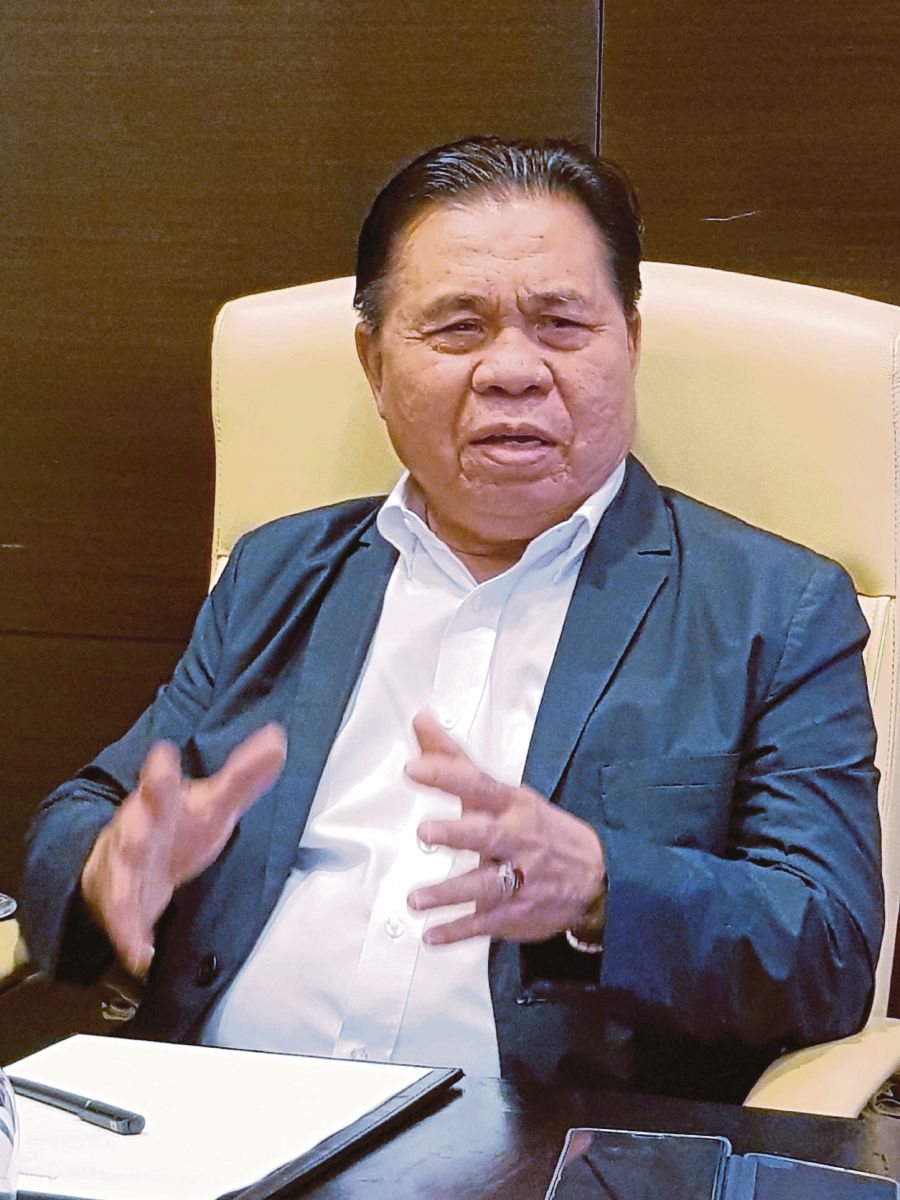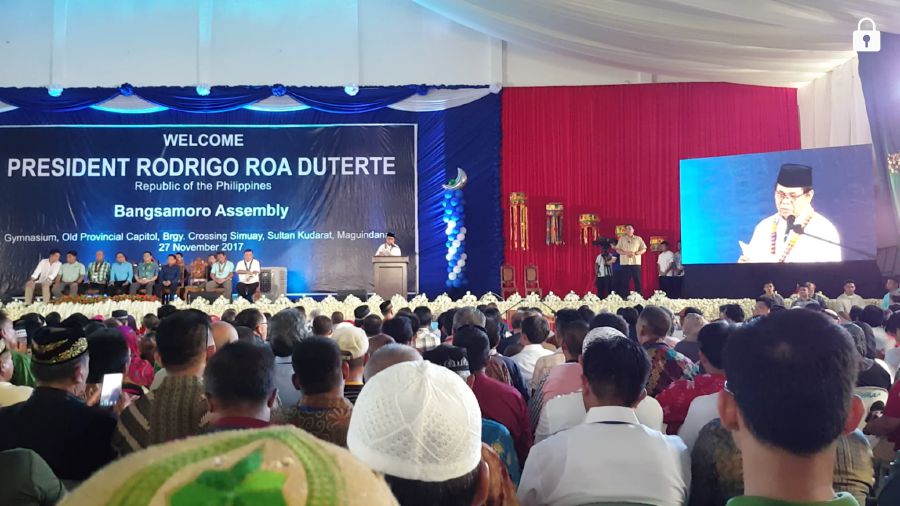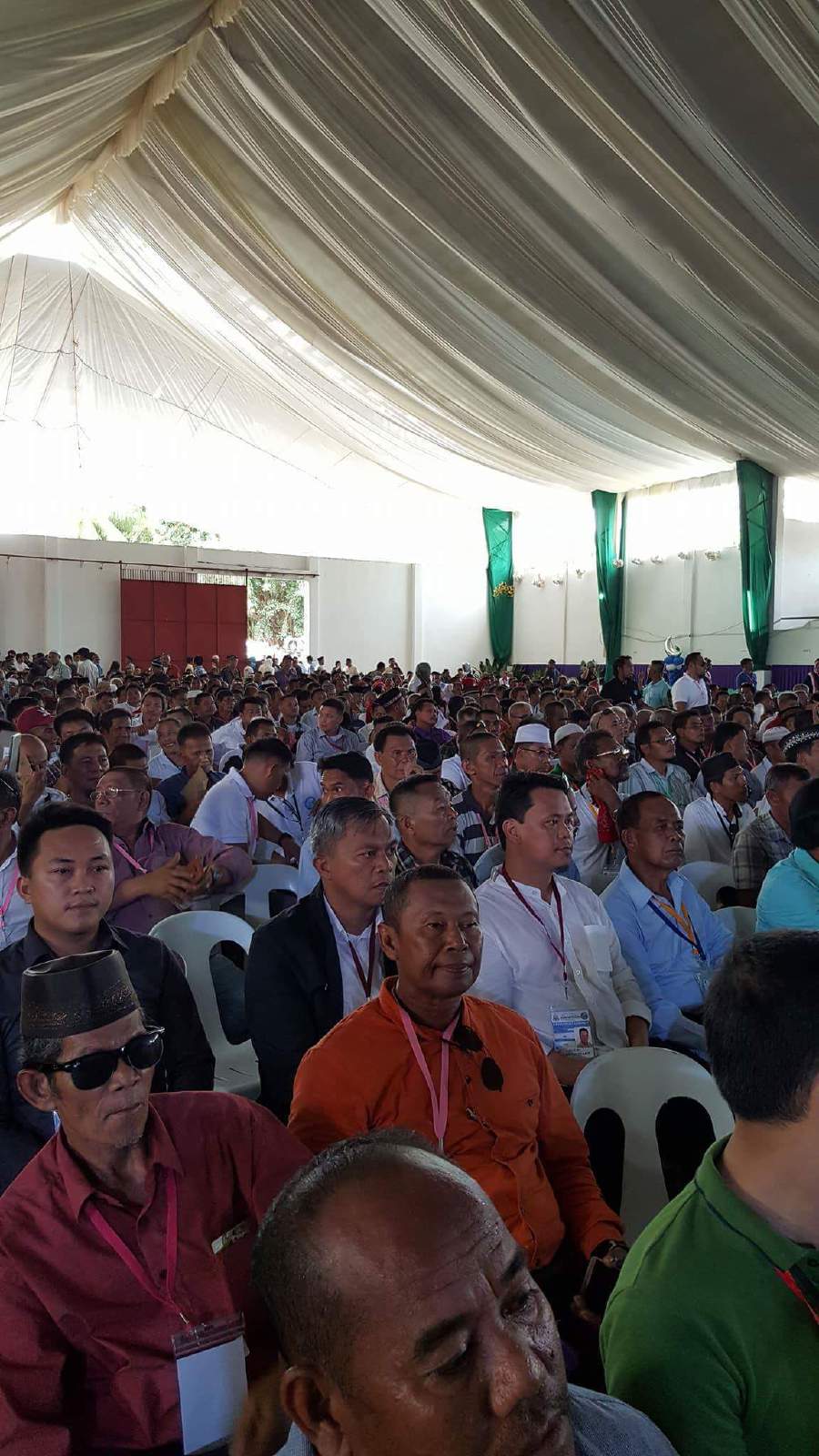Manila’s strategic partner in bringing peace into volatile Mindanao has made headway in neutralising elements that could threaten to turn the region into the new bastion for the Islamic State (IS) militant group.
The Moro Islamic Liberation Front, however, cautions that efforts to rein in existing and emerging extremist groups would be difficult, tenuous at best, without the passage of the Bangsamoro Basic Law (BBL).
In the most recent development, MILF, which has influence in at least 60 per cent of the country’s south, has managed to pull to its side, the Moro National Liberation Front (MNLF) under the leadership of Yusop Jikiri, to promote peace in the region and fight extremism.

Moro Islamic Liberation Front chairman Murad Ibrahim says only by having in place a sound economy and livelihood for the people can there be lasting peace.
Its chairman, Murad Ibrahim, said efforts to consolidate armed groups in Mindanao were being aggressively carried out.
“We are in the convergence phase. With MNLF under Yusop Jikiri, we are confident of moving together... We have two of the three Bangsamoro Islamic Freedom Fighters (BIFF) factions on board, supporting the peace process.
“Even our former members, who are now among the Maute group, are trying to find a way to come to an understanding with us... Our doors are always open to other hardline groups, to give them that chance to converge for peace,” he said in an interview at MILF’s headquarters at the Darapanan Camp.
Question: The planned birth of the BBL seems to be overdue.
Answer: In the proliferation of extremism, the most effective solution to counter this is to have in place a political set-up that is acceptable to the Bangsamoro people. We have seen small groups emerge... from the factions which fell out of MILF, including the Abu Sayyaf group to BIFF. When the BBL was not passed in the last administration, what followed was the emergence of the Maute group in Lanao. All these small groups that emerged came into being because of the non-implementation of the BBL... there is no political solution in place.
Q: There are whispers of some provisions in the proposed BBL being “unconstitutional”.
A: It took us 18 years to sign the Comprehensive Agreement for the Bangsamoro (CAB) that meets the aspirations of the Bangsamoro for self-determination, and one that agrees with the Philippines’ constitution. The contraries made that difficult, so a lot of compromises were made to ensure the political set-up was accepted. Hence, if it is acceptable to the majority of the Bangsamoro, anyone who sabotages it will become the enemy of the people.
Q: Are you encouraged by President Rodrigo Duterte’s promise that he would make the BBL happen and push forward the proposed law until it is passed by congress.
A: I met the president in Sept 4 and he committed that he would do all he could so that the BBL is passed. We state our case that as far as all the legal issues are concerned, the draft of the BBL had gone through a strict and robust review, and there are no unconstitutional provisions in it. In fact, nobody can actually point out anything unconstitutional.
Q: Do you feel there are attempts to dilute the BBL?
A: There are observers who feel that it (claim of unconstitutional provisions) is an excuse to dilute the provisions of the BBL. This is part of the struggle and we will struggle to make sure there is no dilution. The BBL must comply with the provisions of CAB that had been signed. We will not accept a BBL that does not. This has been conveyed.
As far as we stand, the political agreement is completed and signed.
There are no more negotiations. It is provided in the agreement that if there are provisions declared as unconstitutional, then the BTC (Bangsamoro Transition Committee) that crafted the BBL will recommend amendments to the Philippines constitution. That is clear.

The Moro Islamic Liberation Front staged a massive rally in late November at its headquarters in Camp Darapanan, the Philippines, to push for the adoption of the Bangsamoro Basic Law.
Q: You said a delay in passing the BBL will spell disaster. How so?
A: This couldn’t be closer to the truth. We now see IS is losing ground in the Middle East and now they need another ground to operate from. We know that they see the problems in Southern Philippines and they want to capitalise on it. This area is strategic, close to Indonesia, Malaysia and other Asean countries they have eyes on. They are also hoping to capitalise on the radical groups that are around (the region) and the many Islamic organisations sprouting. It will be difficult for us to fight them without any political settlement in place. If the peace process fails, there is no moral ascendancy to fight them. They will be seen as the defenders while we will be merely seen as the one working or rather colluding with the government. This (the BBL) is the only political solution that will effectively counter the ongoing proliferation of extremism in Mindanao. Marawi is a clear signal of bigger things that could happen... and this is a small group that has sustained a fight for five months.
Q: How do you see this unprecedented agreedment for a partnership you just signed with MNLF, working in favour of a stronger Bangsamoro?
A: Our strategic cooperation with MNLF under the leadership of Yusop Jikiri is not only in pursuing the passage of the BBL, but also in countering extremism in this region. People in the south are in full support.
Q: You and your men are all set to put down your weapons for good?
A: We are in that direction. Creating an atmosphere where there are no arms except for the authorities. That is why we agreed on the decommissioning process and we agreed to work together on the disbanding of private armies and drug lords.
We agreed that the final and long term peace can be achieved only with controlled weapons and arms. This will be a challenging process, but once the law is passed, we are willing to cooperate with the government on this aspect.
We did not demand for the integration of our forces. We are willing to lay down our arms, but we also have to strengthen the police force of the Bangsamoro. That will be the official armed wing of the government. There will be a requirement, which includes members of the force having to be qualified.
Q: What is MILF’s strength?
A: We have a significant number of trained combatants. It expands if we mobilise weapons from civilians. Our military wing, which is under the Bangsamoro Islamic Armed Forces, is organised separately from our political wing. Across the region, from the central committee, provinces, municipalities and villages, we have the support of roughly 60 per cent of Mindanao.
Q: MILF is now among enemy No. 1 for the Mindanao-based IS, by virtue of you engaging in the peace process with Manila.
A: This is a non-issue for us as the people do not see it that way. They know that IS is globally condemned by all ulama and they are not Islamic. IS declared us infidels, but that does not affect our credibility, as the people here know we are working for them, their welfare and peace. They believe in MILF and that we are following the right teachings of Islam. The majority of ulama are also with us.
Q: You are certain that nobody doubts your sincerity in this whole peace process?
A: In the case of the Marawi siege, we had avoided by all means to be implicated. We suspect the “spoilers” of this peace process wanted exactly that to use it against us and create another “Mamasapano incident”. But we very much distanced ourselves. There was a time the Maute group demanded that MILF intervene, saying that they would if we did. We said “no”. It could have been a ploy so that it would be manipulated and we would be accused of having been involved in the fighting on the ground. We told them if they really wanted to withdraw, they have all the means to do so without our intervention. There was clearly something else on their mind.

Participants at the rally.
Q: What can the region expect when the BBL is passed?
A: MILF has a blueprint of what we want after we achieve that political solution. It is a development plan for the short, medium and long terms. In developing this area economically, we are looking forward to neighbouring countries helping us in the peace process, to move development programmes forward to ensure sustainability and for lasting peace. Only by having in place a sound economy and livelihood for the people, could there be lasting peace. Many nations, including Malaysia, are engaging with us.
Question: Kuala Lumpur served as the third party during your negotiations with Manila. Does it end there?
A: We have agreed for the role of the facilitator to continue in the implementation process, until an exit agreement is officially signed.
It is when both parties agree that all aspects of the peace process had been implemented. That is when the term of the facilitator officially ends. But we can also agree that there is the long-term process of normalisation, which is parallel to the peace process.
This period is longer because it will involve the rebuilding of vast areas. We need to continue cooperating with the international community, including Malaysia. We look forward to having Malaysia’s continued involvement in the normalisation process.
https://www.nst.com.my/news/exclusive/2017/12/319066/finding-peace-bangsamoro

No comments:
Post a Comment
Note: Only a member of this blog may post a comment.